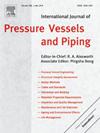Tracking research on the performance changes of S31042 steel under long term service
IF 3.5
2区 工程技术
Q2 ENGINEERING, MECHANICAL
International Journal of Pressure Vessels and Piping
Pub Date : 2024-10-15
DOI:10.1016/j.ijpvp.2024.105344
引用次数: 0
Abstract
S31042 is widely used in ultra-supercritical units due to its excellent comprehensive performance at high temperatures. Tracking and monitoring research was conducted on as-received S31042 tubes and tubes in service for 13 k hours, 31 k hours, and 52 k hours at 650 °C. The results show that as the service time increased, a large quantity of M23C6 phase precipitated along the grain boundaries, gathered and grew up into the bulk. This weakened of the grain boundaries, which facilitated crack propagation and significantly reduced the plasticity and toughness of the S31042 heat-resistant steel. After 13 k hours of operation, the dispersion strengthening of the precipitated phase inside the grain and grain boundary led to a substantial increase in hardness, while there was no obvious change in strength. However, after 52 k hours of operation, the dispersed precipitated phase within the grain slowly aggregated and grew, decreasing the effectiveness of dispersion strengthening. Consequently, both the high-temperature strength and hardness of the S31042 steel gradually decreased. As the service time increased, the continuously distributed and similarly sized M23C6 phases on the grain boundaries of S31042 developed into an inhomogeneous coarsening chain structure. Additionally, the appearance of nanoscale secondary NbCrN and M23C6 phases within the grain and their resulting precipitation strengthening effects were the main reasons for the significant change in S31042 hardness values. Based on these findings, the residual life of S31042 heat-resistant steel in service was predicted using an extrapolation method based on high-temperature creep rupture tests and the relationship model between hardness and the P function. A comparison of the L-M parametric life prediction results with the strength extrapolation life prediction results based on the standard creep rupture test shows that the creep rupture strength extrapolation method is slightly conservative. Therefore, the prediction results based on the hardness L-M parameter method, which is simple and easy to perform, can be used for preliminary life prediction.
S31042 钢在长期使用条件下的性能变化跟踪研究
由于 S31042 在高温下具有出色的综合性能,因此被广泛用于超超临界装置。我们对 S31042 管材的原样和在 650 ℃ 下使用 13 千小时、31 千小时和 52 千小时的管材进行了跟踪和监测研究。结果表明,随着服役时间的延长,大量 M23C6 相沿晶界析出,聚集并增长到管体中。这削弱了晶界,促进了裂纹扩展,并显著降低了 S31042 耐热钢的塑性和韧性。工作 13 k 小时后,晶粒和晶界内析出相的分散强化导致硬度大幅提高,而强度没有明显变化。然而,在工作 52 k 小时后,晶粒内的分散析出相缓慢聚集和增长,降低了分散强化的效果。因此,S31042 钢的高温强度和硬度都逐渐下降。随着使用时间的延长,S31042 晶界上连续分布且大小相似的 M23C6 相发展成不均匀的粗化链结构。此外,晶粒内纳米级次生 NbCrN 和 M23C6 相的出现及其产生的沉淀强化效应是 S31042 硬度值发生显著变化的主要原因。根据这些发现,采用基于高温蠕变断裂试验和硬度与 P 函数关系模型的外推法预测了 S31042 耐热钢在使用中的残余寿命。将 L-M 参数寿命预测结果与基于标准蠕变断裂试验的强度外推法寿命预测结果进行比较后发现,蠕变断裂强度外推法略显保守。因此,基于硬度 L-M 参数法的预测结果简单易行,可用于初步寿命预测。
本文章由计算机程序翻译,如有差异,请以英文原文为准。
求助全文
约1分钟内获得全文
求助全文
来源期刊
CiteScore
5.30
自引率
13.30%
发文量
208
审稿时长
17 months
期刊介绍:
Pressure vessel engineering technology is of importance in many branches of industry. This journal publishes the latest research results and related information on all its associated aspects, with particular emphasis on the structural integrity assessment, maintenance and life extension of pressurised process engineering plants.
The anticipated coverage of the International Journal of Pressure Vessels and Piping ranges from simple mass-produced pressure vessels to large custom-built vessels and tanks. Pressure vessels technology is a developing field, and contributions on the following topics will therefore be welcome:
• Pressure vessel engineering
• Structural integrity assessment
• Design methods
• Codes and standards
• Fabrication and welding
• Materials properties requirements
• Inspection and quality management
• Maintenance and life extension
• Ageing and environmental effects
• Life management
Of particular importance are papers covering aspects of significant practical application which could lead to major improvements in economy, reliability and useful life. While most accepted papers represent the results of original applied research, critical reviews of topical interest by world-leading experts will also appear from time to time.
International Journal of Pressure Vessels and Piping is indispensable reading for engineering professionals involved in the energy, petrochemicals, process plant, transport, aerospace and related industries; for manufacturers of pressure vessels and ancillary equipment; and for academics pursuing research in these areas.

 求助内容:
求助内容: 应助结果提醒方式:
应助结果提醒方式:


